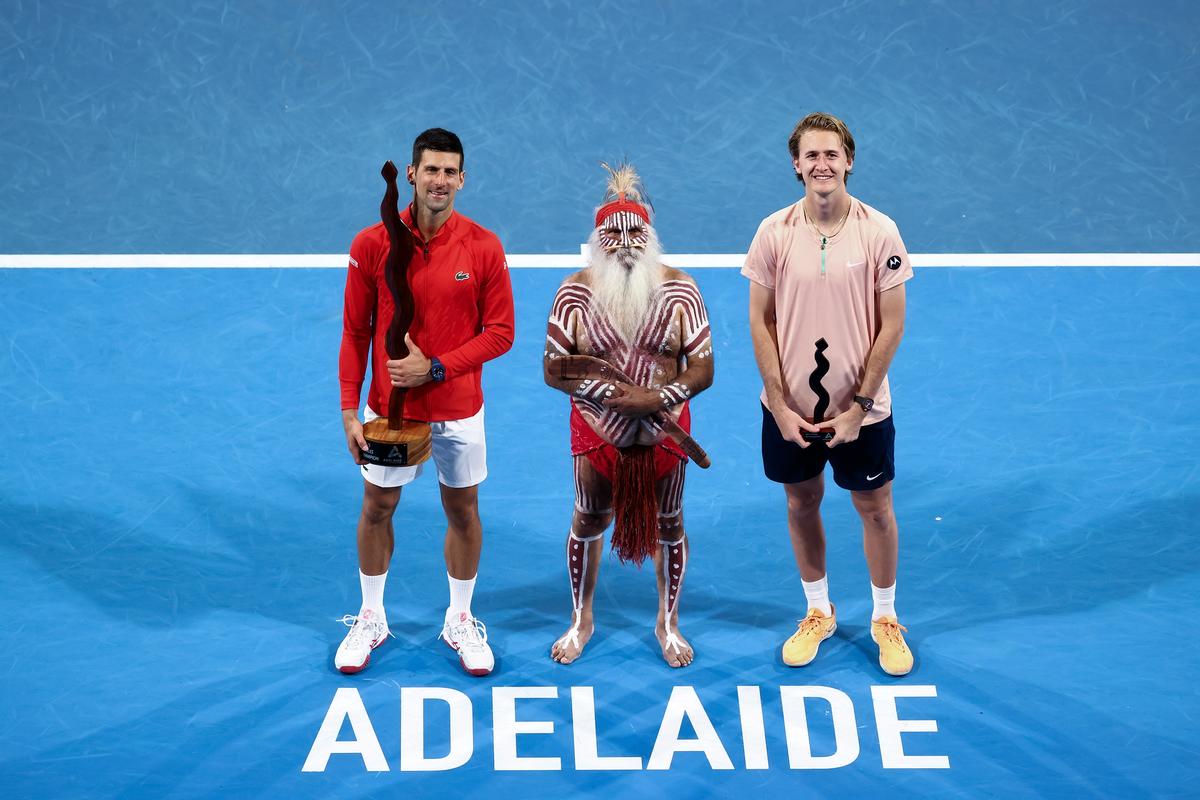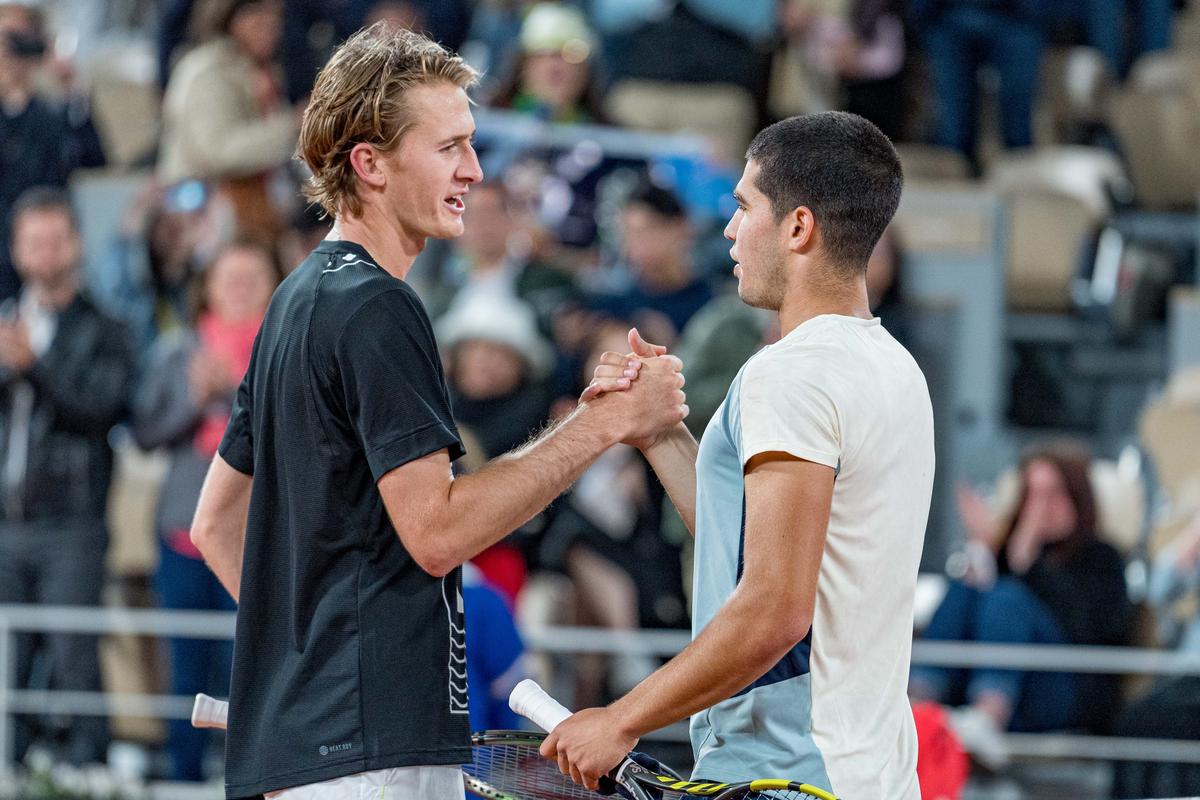There was a time when Sebastian Korda seemed United States of America’s best bet to end its nearly two-decade long search for a men’s singles Major champion. He broke out at the 2020 French Open by reaching the fourth round and repeated it at Wimbledon a year later. This was even before current top-10 players Taylor Fritz and Ben Shelton had similar results to show.
But persistent injuries took a toll and Korda, who peaked to World No. 15 last August, is now 60. However, his consummate all-court skills, relatively young age of 25 and excellent sporting genes – father Petr won the 1998 Australian Open; mother Regina Rajchrtova was a top-30 player and sisters Jessica and Nelly are both LPGA golf professionals, with the latter a two-time Major winner and a former World No. 1 – mean he is still looked at with hope.
Korda spoke to The Hindu on his growing up years, the influence of his family, his career so far and the state of men’s tennis. Excerpts:
ALSO READ | Why the Alcaraz-Sinner duopoly will mirror the Big Three era in tennis
In August 2024, you won your biggest title at Washington 500 and rose to your career-best ranking. But since then, you have had a lot of injuries. How do you assess the last 12 odd months?
It’s been the most difficult period in my career. I’ve had an elbow surgery, an ab tear, a stress fracture in my shin… but I’ve got some great people around me and they make it easier. As an athlete, all you want to do is just practice, go play and enjoy yourself. But I’ve not been able to do any of that. So yeah, kind of taking a step back and trying to stay positive.
You reached the French Open fourth round in 2020, and then the Wimbledon fourth round the next year. From then to now, how have you transformed as a player?
My body has completely changed. I was extremely skinny back then, and inexperienced. I’m definitely not as young as I was, but I still feel like I’m one of the younger guys on the [ATP] Tour. I am still super excited to go to every single tournament, into every practice. I’ll hopefully keep going in the right direction, and results will follow.
In 2021, you reached the ATP Next Gen tournament final but lost to Carlos Alcaraz. But his career has gone in one direction and yours differently. Is it frustrating or is it motivating to feel that you were once equal to him and you can very well achieve what him and others have gone on to?
It’s obviously frustrating not being where they are, but every journey is completely different. I’m still 25, and hoping I can still play tennis for another 10, 15 years, get to a better ranking and compete with them on a regular basis. Hopefully, I have a lot of my best years ahead of me. I have to, most importantly, stay healthy because when I’m healthy, I can play some really good tennis.
ALSO READ | Anisimova 2.0: stronger, faster and resilient
Australia is a place where you have had good results, having reached the Adelaide 250 final twice (2023 and 2025). In the 2023 final against Novak Djokovic, you had a match-point in the second set. What do performances like these tell you?
It’s super motivating. When you have great results and you’re really competing with the best in the world, it’s a big positive. You learn so much, like what Novak does in certain situations. He was playing a certain game style right up until the match-point. And then, he completely changes and does something entirely different. It’s a big learning curve. How they figure out things on the go, and change things.
You seem to be pretty adept on all surfaces. Does it come naturally?
My parents raised me on clay, and I was playing on it until I was about 14. It was green clay, a little bit different, but it’s still clay nonetheless. You learn how to use the court differently and all different kinds of shots to get you over the line.
How did it help you transition to other surfaces?
You learn patience. You have to go to the net at the right moments. If you don’t, you get passed super easily. And you kind of spin the ball, slice, drop shot… you learn a lot. It’s just a lot of feel. And if you have good feel, you go to grass and you can go to the net a little bit more and that helps you. Having that versatility is key.

Matching up: The Adelaide ATP 250 final in 2023 that Korda lost to Novak Djokovic in a close three-setter was enough evidence that the young American had the game to excel in the upper echelons of men’s tennis
| Photo Credit:
Getty Images
In this century, tennis has had a lot of players who are good on all surfaces. Roger Federer, Rafael Nadal, Djokovic, Andy Murray and now Alcaraz and Jannik Sinner. What do you put it down to?
Players are adapting extremely well. It’s really rare for someone to have a shot that’s not at a really high calibre. Earlier, if someone didn’t have a good backhand, opponents would just go after that shot the whole time. But now, everyone moves really well, serves well… it’s becoming more difficult to have one bad shot you can go after. So then, you become more of an all-around player [to beat that guy]. In a way, everyone’s helping each other.
ALSO READ | Djokovic has no plans to retire, inspired by Ronaldo, LeBron and Brady

Contrasting trajectories: In the 2021 Next Gen Finals, Korda was runner-up to Alcaraz. But after that, the Spaniard soared to great heights while injuries marred Korda’s progress
| Photo Credit:
Getty Images
With Federer and Nadal retired, and Djokovic closer to the end, men’s tennis was supposed to be up and down. Did you expect Alcaraz and Sinner to take it to such a high level this quickly?
It’s been quite exceptional. Roland-Garros was one of the best Slam finals in a long time, and to stay at that intensity and have that level for five hours and 20 something minutes is extraordinary. So they have set the bar at a certain standard, and everyone’s working their socks off to get to that level and hopefully not allow them to split the Grand Slams every year! But also, it doesn’t matter if you are ranked 80 or 20, it’s such a small gap. Obviously you have someone dominating at the top but it is very competitive for everyone else around.
How has your family’s sporting background helped?
The biggest thing for my parents was only to keep us active as kids – throw us into any sport possible, learn all the mechanics and all the fundamentals and then try to use it in your own sporting life. Growing up playing [ice] hockey, I learnt a lot of balance, and that helps me on a tennis court to be in a neutral position. With golf, you learn patience, and it’s a big help with my sisters being individual athletes. We go through the same things, and I can ask them questions to help me. With both my parents being tennis players, it helps because they have gone through everything that I go through and they just don’t want me to make the same mistakes.
What are your near- and long-term goals?
The goal right now is just to finish the season. It’s been a long year. Mentally, it’s been extremely challenging. I would love to finish the year playing every single tournament and we’ll see where it takes me.
